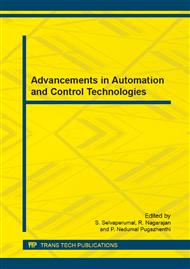p.130
p.136
p.143
p.150
p.155
p.161
p.169
p.176
p.181
Hybrid Anti-Windup Fuzzy PI Controller Based Direct Torque Control of Three Phase Induction Motor
Abstract:
This paper presents improved Fuzzy Logic Controller (FLC) of the Direct Torque Control (DTC) of Three-Phase Induction Motor (IM) for high performance and torque control industrial drive applications. The performance of the IM using PI Controllers and general fuzzy controllers are meager level under load disturbances and transient conditions. The FLC is extended to have a less computational burden which makes it suitable for real time implementation particularly at constant speed and torque disturbance operating conditions. Hybrid control has advantage of integrating a superiority of two or more control techniques for better control performances. A fuzzy controller offers better speed responses for startup and large speed errors. If the nature of the load torque is varied, the steady state speed error of DTC based IM drive with fuzzy logic controller becomes significant. To improve the performance of the system, a new control method, Hybrid fuzzy PI control is proposed. The effectiveness of proposed method is verified by simulation based on MATLAB. The proposed Hybrid fuzzy controller has adaptive control over load toque variation and can maintain constant speed.
Info:
Periodical:
Pages:
155-160
DOI:
Citation:
Online since:
June 2014
Authors:
Price:
Сopyright:
© 2014 Trans Tech Publications Ltd. All Rights Reserved
Share:
Citation:


